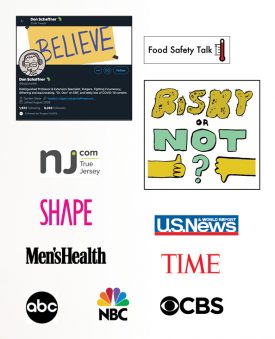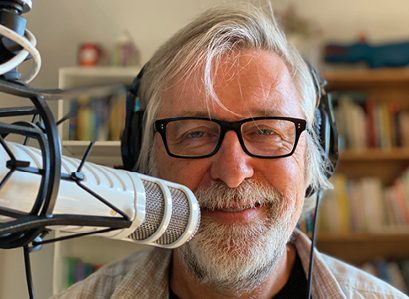The New Jersey Agricultural Experiment Station 2020 Annual Report spotlights the many stories of outreach and resilience during COVID-19. To read more, see the NJAES 2020 Annual Report.
Don Schaffner, Distinguished Professor and extension specialist in food science, has been thinking about the risks posed by microorganisms for more than 30 years. About 20 years ago, he became very interested in studying the science of hand washing and quantifying microbial cross-contamination, so it was no surprise when he turned his attention to COVID-19.
Since the start of the pandemic he’s answered questions about the benefits of hand sanitizers versus washing your hands (it turns out both are very effective at reducing risk of COVID-19), whether it’s necessary to spray down your takeout and delivery with Lysol (no, it’s not), whether you should wash your fresh produce with soap (no), whether you need to sanitize your groceries after you get them home from the store (also no), as well as a variety of questions about how long SARS-CoV-2 (the virus that causes COVID-19) can last on surfaces, or whether the virus can be spread by food or food packaging (the answer appears to be no, at least for now).
 Schaffner has provided answers to these questions and many others while he’s been interviewed by multiple national publications like the The New York Times, The Washington Post, Wall Street Journal, and Atlantic magazine as well as a whole host of radio and TV stations across the country. He uses his Twitter account @bugcounter to post threads discussing these issues for his enthusiastic followers. COVID-19 and SARS-CoV-2 are also frequent topics on his two podcasts, Food Safety Talk, and Risky or Not.
Schaffner has provided answers to these questions and many others while he’s been interviewed by multiple national publications like the The New York Times, The Washington Post, Wall Street Journal, and Atlantic magazine as well as a whole host of radio and TV stations across the country. He uses his Twitter account @bugcounter to post threads discussing these issues for his enthusiastic followers. COVID-19 and SARS-CoV-2 are also frequent topics on his two podcasts, Food Safety Talk, and Risky or Not.
His interest in providing advice to the food industry, ranging from small restaurants to large multinational corporations, led him to partner with colleagues at North Carolina State University and elsewhere to create FoodCoVNET, which is now supported by the Foundational and Applied Science Program of Agriculture from the USDA National Institute of Food and Agriculture.
The FoodCoVNET team is cataloging, collating, reviewing, and then rapidly disseminating existing scientific data on SARS-CoV-2 extracted from the plethora of published material as well as identifying COVID-19 management strategies to fill the gaps for the food industry. Schaffner is also part of a team that will be conducting laboratory research with harmless viruses to see whether they can be used to predict SARS-CoV-2 virus survival and spread.


